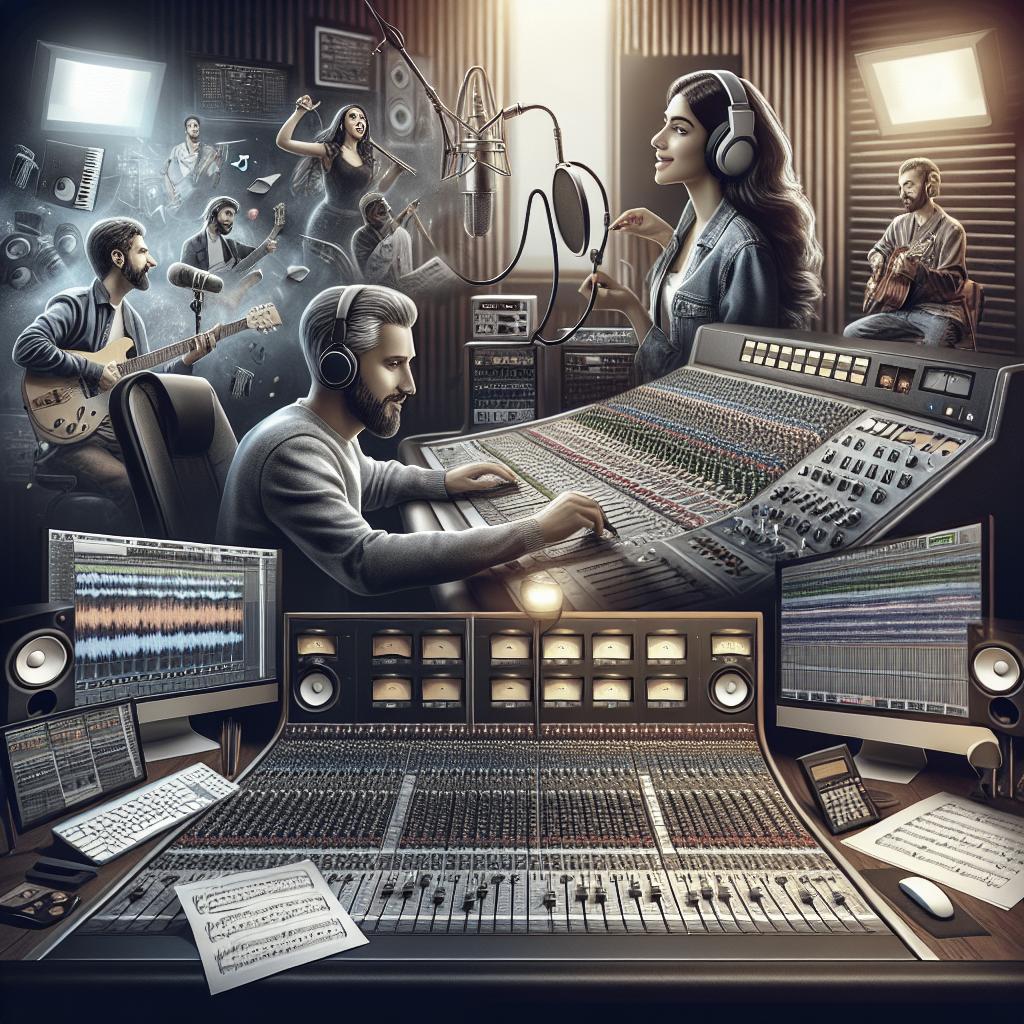“`html
Discovering Profitable Melodies: How to Make Money from Music
For musicians, turning passion into a profession involves a harmonious blend of creativity and strategy. From live performances to teaching, the digital age offers countless avenues to monetize your musical talents. This blog post explores 21 dynamic ways you can generate income as a musician, whether you’re starting out or looking to expand your existing career. Alongside practical tips, you’ll find answers to some of the most frequently asked questions on this melodic journey, equipping you with insights to thrive in the ever-evolving music industry.
21 Ways to Make Money as a Musician
01. Perform Live Gigs
Performing live is one of the most traditional and rewarding ways to make money as a musician. Whether you’re a solo performer or part of a band, live gigs allow you to showcase your talent, build a fanbase, and earn through ticket sales and venue payments. Many venues offer additional perks like free meals, which can offset your expenses.
Establishing a schedule and securing regular gigs at local venues can create a steady income stream. As your popularity grows, you can negotiate better pay and even explore opportunities to perform at larger events and festivals, enhancing both your exposure and earnings.
02. Teach Music Lessons
Sharing your expertise through music lessons not only provides a satisfying income source but also enriches the lives of others. You can offer lessons in person or online, catering to beginners or students seeking advanced skills. Tailor your services to individual needs to attract a diverse client base.
Platforms like Zoom or Skype make online classes a viable option, allowing you to reach students worldwide. By offering free sample lessons or referral discounts, you can attract more students and significantly boost your teaching revenue.
03. Sell Merchandise
Branding is a powerful tool, and creating merchandise like t-shirts, posters, and albums helps to promote your music while generating revenue. Merchandise not only serves as a marketing tool but also allows fans to show support, creating a stronger community around your music.
Online platforms like Shopify or Etsy can be used to set up your store, while live concerts offer a unique opportunity to sell directly to engaged fans. Consistently updating your merchandise selection keeps fans interested and increases sales.
04. Stream Your Music
Streaming services like Spotify, Apple Music, and Amazon Music allow musicians to reach a global audience. These platforms provide royalties based on the number of streams your music receives, making them a potentially lucrative revenue source.
While streaming payments might seem small at first, over time and with increased listener engagement, these can accumulate. Actively promoting your music and including it in curated playlists can significantly boost your streaming income.
05. Digital Sales
Digital sales of your music through platforms like iTunes and Bandcamp make your work accessible to a larger audience. Offering albums, EPs, or singles for download gives fans a way to financially support your art while diversifying your income.
Consider offering exclusive tracks or bundled deals to entice purchases. Digital sales also grant greater control over pricing and distribution, allowing for strategic planning in line with market trends.
06. Monetize Your YouTube Channel
YouTube offers a dynamic platform for musicians to showcase their talent and connect with audiences. Monetizing your YouTube channel involves enabling ads, partnering with brands, or seeking sponsorships to generate income from views and engagement.
Beyond ad revenue, using YouTube as a portfolio can lead to opportunities like collaborations, performance bookings, and fan donations via platforms like Patreon, enhancing your income potential.
07. Crowdfunding Campaigns
Crowdfunding through platforms like Kickstarter or Indiegogo offers musicians the opportunity to finance projects by engaging directly with their audience. Campaigns can be organized for albums, tours, or even music videos.
Successful crowdfunding requires a compelling story, clear goals, and enticing rewards for backers. Engaging with your community and delivering on promises not only funds your projects but also builds enduring fan relationships.
08. License Your Music
Licensing your music for use in films, TV shows, or advertisements can be extremely lucrative. Platforms like Musicbed or Songtradr act as intermediaries, connecting your music with potential buyers.
Understanding the legalities and maintaining a catalog of your best work can open doors to consistent royalty earnings. Being proactive and reaching out to independent filmmakers or local advertising agencies can further broaden opportunities.
09. Session Work
Providing session work for other artists allows you to diversify your skillset and income. This involves playing instruments, singing backup, or contributing to recording sessions.
Networking within the music industry and building a reputation for reliability and professionalism are key to securing session opportunities. Establishing connections with producers or recording studios can lead to consistent work.
10. Music Production Services
Offering music production services, such as mixing and mastering, can be a profitable venture for those with technical skills. Aspiring musicians often seek out producers to help realize their vision, offering a steady client base.
Showcasing your work on platforms like SoundCloud or LinkedIn can attract clients, while setting competitive rates can help establish your services in the market. Expansion into different genres can further increase your client base.
11. Write Music Reviews or Blogs
Combining a love for music and writing can open up roles as a reviewer or blogger. Platforms like Medium or music websites often hire writers to share insights or critiques, allowing you to earn from your perspective.
Creating your own blog can also turn profitable through ad revenues or collaborations with brands. Engaging content and consistent publication schedules can grow your readership and income potential.
12. Compose for Commercials or Online Games
The demand for custom music in commercials and online games presents unique opportunities for composers. This niche requires creativity and an understanding of media production to create compositions that enhance visual experiences.
Freelance platforms like Upwork or Fiverr can help you connect with clients seeking tailored compositions. Networking with game developers or corporate agencies can also lead to consistent project work.
13. Music Therapy
Music therapy uses the healing properties of music to improve emotional and physical well-being, offering a fulfilling career option for musicians. Special training and certification enable you to provide therapeutic services in schools, hospitals, or private practices.
By combining musical skills with therapeutic techniques, you can positively impact lives while earning a steady income. This field continues to grow, with increasing recognition of music’s benefits to mental health.
14. Music Festivals and Workshops
Participating in music festivals or workshops allows performers to reach new audiences and gain exposure. These events often offer performance fees, workshop facilitation payments, and merchandise sales opportunities.
Networking with festival organizers or music educators can reveal exposure opportunities and external partnerships, expanding your professional footprint while generating revenue.
15. Songwriting for Other Musicians
Offering your songwriting prowess to other musicians can diversify your income and expand your artistic reach. Collaborating on projects allows for creative exchanges and exposes your work to broader audiences.
Songwriter royalties offer ongoing income, and joining societies like ASCAP or BMI can help you manage and maximize these earnings. Partnerships with publishers or music labels can further improve your reach.
16. Sell Vintage Cassettes, CDs, and Vinyl Records
Capitalizing on nostalgia and the resurgence of analog music formats, selling vintage cassettes, CDs, and vinyl records can generate significant revenue. Collectors worldwide seek out these items, creating a robust market.
Set up your online store through platforms like Discogs or eBay and curate a collection that appeals to diverse tastes. Researching market trends can help you competitively price your inventory.
17. Host or Stream Live Music Shows
Hosting live music events or streaming them online can significantly boost your visibility and income. Creating a themed series or working with guest musicians for collaborations broadens your audience reach.
Social media platforms like Instagram or Facebook offer streaming features, while charging for access or receiving donations can increase your revenue. Engaging with attendees through Q&As or shoutouts enhances the interactive experience.
18. Affiliate Music Marketing
Affiliate music marketing involves promoting products or services and earning commissions on resulting sales. This can range from musical gear to online courses or product endorsements.
Joining affiliate programs through entities like Amazon or music-focused platforms and partnering with brands aligns your work with products that resonate with your audience, driving income while enhancing your brand’s offerings.
19. Transcribe Songs into Sheet Music
Transcribing songs into sheet music caters to musicians and educators, providing a valuable service for those seeking to learn new pieces. Accuracy and style adaptation are key skills in this niche.
Freelancing sites like Fiverr or direct commissions from educators and musicians can generate consistent work. Offering package rates or specialized transcription services can bolster your client base.
20. Play Music Mixes as a DJ (Weddings, Parties, etc.)
As a DJ, providing music mixes for weddings, parties, or corporate events offers a vibrant and profitable revenue stream. Understanding different genres and audience preferences helps tailor your offerings.
Creating a memorable experience can lead to repeat bookings and referrals. Building a setlist that suits each event and investing in quality equipment ensures you deliver professionally and expand your clientele.
21. Instrument Repair and Tuning Service
Skilled in instrument repair and tuning? Offering these services can create a consistent income, supporting fellow musicians in maintaining their gear. Setting up a home workshop reduces overhead costs.
Advertising through local music shops, schools, or online forums can attract clients. Providing high-quality service and earning trust within the community lays the groundwork for a successful business.
How to Start Making Money from Music
Embarking on your musical monetization journey begins with identifying your strengths and aligning them with market needs. Embrace platforms and opportunities that align with your style, such as live gigs or digital streams.
Networking, building an online presence, and continuously honing your craft will open avenues for income. Persistence and adaptability are key as you navigate changes within the industry landscape.
How to Set Yourself Up for Success so You Can Make Money as a Musician
01. Define Your Value Proposition
Your value proposition highlights what makes you unique. Identifying your niche and the special qualities you bring to your musical endeavors can assist you in standing out in the market.
Your value proposition not only guides your music’s direction but also informs your branding and marketing efforts, helping attract and retain a loyal audience base.
02. Identify Revenue Streams
Exploring various revenue streams diversifies your income avenues, building financial stability. Analyze potential sources such as live gigs, digital sales, and merchandise, and evaluate what aligns best with your brand and goals.
Tracking income from each source enables you to discern patterns and refine strategies, optimizing your efforts for maximum returns.
03. Build Branding and Marketing Strategies
Strong branding communicates your music’s essence and resonates with audiences. Creating a cohesive marketing strategy involving content creation, social media platforms, and collaborations extends your reach.
Regular engagement with your audience through comments, behind-the-scenes insights, and collaboration teasers maintains interest and supports a vibrant community around your music.
04. Establish Sound Financial Management
Sound financial management ensures sustainable growth. Setting budgets, tracking expenses, and planning for taxes helps secure your music ventures financially.
Consider seeking guidance from financial advisors or using budgeting tools to manage finances efficiently, enabling growth and adaptation in a dynamic industry.
Making Money as a Musician FAQ
How Can I Start Making Money from My Music if I’m Just Starting Out?
If you’re new to monetizing your music, begin by exploring platforms that cater to beginners, such as YouTube or indie-focused streaming services. Offering services like music lessons or engaging with local music communities can also provide foundational income.
How Hard Is It to Make Money as a Musician Compared to Other Jobs?
The music industry can be competitive, and income may be inconsistent initially. However, passion, persistence, and strategic planning can lead to a sustainable career. Diversifying income sources and adapting to changes can buffer financial uncertainties.
Is It Possible to Make a Living Solely from Streaming Revenue?
While some artists achieve significant revenue from streaming, solely relying on it can be challenging due to low payout rates per stream. Supplementing with additional income sources like live performances and merchandise sales is often needed for stability.
How Do I Price My Performances or Music Lessons?
Pricing should reflect your expertise, market demand, and regional pricing standards. Consider tiered pricing or packages to accommodate varying client budgets while maximizing your value.
What’s the Best Way to Market My Music Business?
Effective marketing combines online promotion with offline networking. Utilize social media platforms, collaborate with influencers, and maintain a dynamic website. Engaging content and consistent branding enhance your professional image.
Can I Make Money from My Music Without Being a Performer?
Yes, opportunities like songwriting, licensing, and production services allow musicians to earn without performing. Exploring freelance platforms or direct partnerships expands prospects beyond traditional performance avenues.
How Do I Protect My Music from Copyright Infringement?
Register your music with copyright offices and performance rights organizations. Maintaining legal protection through agreements and contracts can safeguard your intellectual property rights. Consulting a legal professional can ensure comprehensive protection.
Should I Sign with a Record Label to Make Money from My Music?
While record labels can offer valuable exposure, retaining creative control and rights is crucial. Explore independent releases or partnerships before deciding, and weigh the pros and cons against your long-term goals.
How Do I Find Opportunities to License My Music?
Joining licensing platforms like Musicbed or directly approaching filmmakers and advertisers can yield opportunities. Building a quality catalog and networking are vital steps in securing licensing deals.
What Kind of Merchandise Sells Best at Concerts?
Popular merchandise includes t-shirts, vinyl records, and posters. Offering exclusive, limited-edition items can drive sales and engage fans. Diversifying your range to include signed memorabilia or themed products enhances buyer interest.
Is Crowdfunding a Reliable Way to Fund My Music Business?
Crowdfunding can provide substantial funding if well-executed. Establishing trust, clarity, and strong communication with your audience can convert supporters into financial backers. Delivery on promises is key to sustaining support.
What Are Some Common Financial Mistakes to Avoid as a Musician?
Avoiding underpricing services, failing to budget, or neglecting to plan for taxes are common pitfalls. Additionally, diversifying income sources can buffer against lean periods and enhance financial security.
How Do I Handle Taxes for My Music Income?
Maintaining detailed records of income and expenses facilitates tax preparation. Consulting with a tax professional ensures compliance and maximizes deductions, safeguarding your financial standing.
Can I Make Money from My Music Without a Large Following?
A large following is not requisite for generating income. Niche audiences often provide strong support, valuing connection over size. Quality, engagement, and diversified income strategies can sustain your music business regardless of follower count.
Other Ways to Make Money You Might Want to Consider
Beyond traditional avenues, consider exploring opportunities like hosting workshops, licensing your music for podcasts, or creating music-based educational content. As the digital landscape evolves, new paths continuously emerge, inviting fresh, innovative monetization strategies.
Lessons Learned
| Method | Description |
|---|---|
| Perform Live Gigs | Engage audiences directly with live performances, allowing for ticket sales and increased visibility. |
| Teach Music Lessons | Impart musical knowledge and skills through personalized teaching formats, both offline and online. |
| Sell Merchandise | Enhance branding and create additional revenue through music-related products. |
| Stream Your Music | Utilize digital platforms to disseminate music widely and gain royalties based on plays. |
| Digital Sales | Offer downloads of singles and albums, leveraging platforms like iTunes to reach audiences. |
| Monetize Your YouTube Channel | Generate income through ad revenue and sponsorships by showcasing your music videos and content. |
| Crowdfunding Campaigns | Fund projects directly through fan support, offering rewards and updates to backers. |
| License Your Music | Earn from media uses in movies, TV, or commercials, ensuring ongoing royalty income. |
| Session Work | Contribute to recording projects for others, earning fees for instrumental or vocal contributions. |
| Music Production Services | Expand into mixing and mastering, providing technical expertise to enhance recorded music. |
“`


